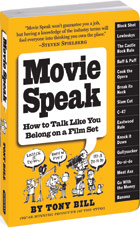(Workman Publishing, $8.95)
By Tony Bill
 When Peter and Bobby Farrelly walked onto the set of their first movie, Dumb & Dumber, they counted between the pair of them not one second of actual on-set experience, let alone direction. Things were touch and go, Peter later recalled, until they intuited that a good relationship with the assistant director was the fastest route to looking like they had a clue what they were doing. Today such rocky moments might be avoided by judicious consultation of director-producer-actor (and DGA member) Tony Bill’s handy and amusing compilation of on-set code words and film-speak.
When Peter and Bobby Farrelly walked onto the set of their first movie, Dumb & Dumber, they counted between the pair of them not one second of actual on-set experience, let alone direction. Things were touch and go, Peter later recalled, until they intuited that a good relationship with the assistant director was the fastest route to looking like they had a clue what they were doing. Today such rocky moments might be avoided by judicious consultation of director-producer-actor (and DGA member) Tony Bill’s handy and amusing compilation of on-set code words and film-speak.
Every profession has its own secret language, from accountancy to animal husbandry, from the Mafia to the market-trading floor, and success is often lubricated by fluency and ease in the adopted argot. As Bill says in his introduction, “Movie sets are another country with a language all its own, much of it fading or forgotten. It’s a largely oral tradition passed down over the last hundred years.” Well, it’s secret no more, and first-time on-set bluffers now have at hand the phrasebook to lead them into this strange and confusing universe. It’s also an educational and entertaining read for hardened veterans.
No longer will a neophyte mistake a “taco truck” for anything to do with Mexican food; in this context it’s a grip’s cart. He or she will learn that an “Obie” isn’t some Broadway award but a light developed by cameraman Lucien Ballard for his wife Merle Oberon to illuminate her splendid eyes. A “nine-iron” isn’t a golf club; it’s a long-handled pooper-scooper for horses in old Westerns, and “nine-iron it” has come to mean “clean that all up.” Likewise, a “mouse” has nothing to do with computers or cheese; it’s the eraser used on a slate. There’s one of these on every page, usually knowingly and wittily annotated by the author, who has been, to steal one of his own phrases “on more sets than a lot of rental equipment.”
What distinguishes this dictionary is Bill’s own voice, which appears in numerous extended discourses on subjects close to his heart, or bêtes noires that just burn his biscuits. Filled with reminiscences about Sinatra, Coppola, Malick and Spielberg, and wise words on the realities of the film set, he’s a smart and amiable guide for newbies—as well as old hands—to the arcane mysteries of moviemaking.
Review written by John Patterson.